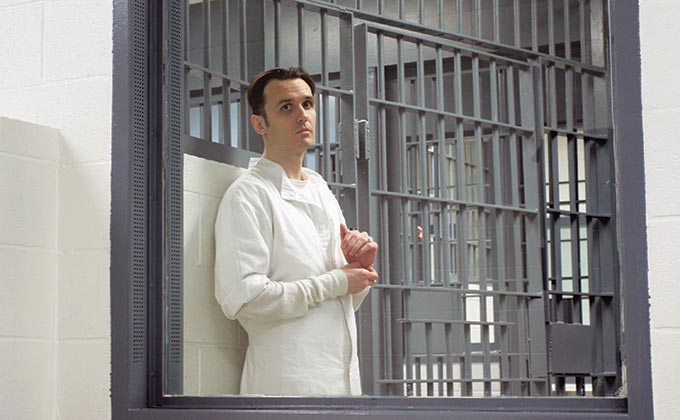West of Memphis
by George Sax

Justice Delayed, Denied, And Debased
West of Memphis
Almost 15 years ago, The New Yorker magazine ran a piece about the prevalence of prosecutorial misconduct in American criminal justice. There were, it suggested, an alarming number of cases in which the people’s attorney acted in careless or even flagrant disregard of defendant’s rights and the interests of justice. And it indicated that these dismaying lapses were usually not addressed by their colleagues or superiors.
Amy Berg’s grimly fascinating documentary West of Memphis is about a notorious case of child murder in a small Arkansas town, a case where the prosecutors, and others, acted with a mix of irresponsible and inflammatory tactics and very possibly bad faith. In 1993, three eight-year-old boys went missing there and were soon discovered dead, their bodies dumped in a creek and, it was said, bearing signs of mutilation. In short order, three youths, only boys themselves—Damien Echols, Jason Baldwin, and Jesse Misskelley, Jr.—were arrested and charged with murder.
The three were marginal members of the town’s population, poor white trash in some people’s minds. The police quickly obtained confessions from them, an especially incriminating one from Misskelley, who was widely regarded as having a sub-average intelligence. The three not only confessed but agreed to the police’s criminal scenario of their obsessive involvement with the occult and gruesome satanic rituals of sacrifice. Skillfully using old clips and footage and interviews, West of Memphis vividly portrays the morbidly sensational environment that surrounded and permeated this case, and which the prosecution orchestrated. But it was the confessions that sealed the courtroom fates of the young defendants. Baldwin and Misskelley were given life in prison, Echols the death penalty.
In this regard, Berg’s movie resembles Rick and Sarah Burns’s recent documentary The Central Park Five, which related the story of New York kids who confessed to a gang assault and rape that they never committed. The same gamed process elicited the confessions in West Memphis from the frightened, intimidated boys. The police especially applied their methods to the suggestible, anxious Misskelley, feeding him “facts” that didn’t jibe with the available evidence but that went into his self-damning statement. The DA, Scott Ellington, ran wild with these concocted statements and with the inflammatory nonsense about satanic motivations.
The movie is much more than a carefully documented examination of this case. It plays out like a detective story and as sometimes startling information is progressively revealed, and counter theories are offered, a dramatic force accumulates. A prime suspect is even identified, one virtually hiding in plain sight. A picture of small-town life is also repeatedly glimpsed, often in key interviews with important figures in this story. People inadvertently reveal the influences of ignorance, prejudice and ambitious hubris, some of them stubbornly insisting on reliably discredited assertions.
In recapping the beginnings of the case, Berg and co-writer Billy McMillin significantly rely on the three Paradise Lost movies, made between 1996 and 2011 by Joe Berlinger and Bruce Sinofsky, which brought the young men’s plight to wide attention and were indirectly instrumental in their eventual release. The three youths were easy marks for the police and prosecution, poor, socially alienated, regarded disapprovingly by respectable people, including school teachers, and given to Goth affectations, which were too easily hyperbolized into devilish iniquity. The picture shows us a bit of the early 1990s media environment in which TV talkers like Phil Donahue featured putative consultants preaching the dangers of youthful satanic tendencies. (Will it surprise anyone to learn that Geraldo Rivera enthusiastically hyped this kind of thing?)
There’s little doubt that the three would still be incarcerated but for a dedicated group of supporters, including generous legal counsel, complemented and crucially funded by celebrities like rockers Henry Rollins and Eddie Vedder, actors Johnny Depp and Catherine Keener, and Lord of the Rings filmmakers Peter Jackson and Fran Walsh (also among the producers of this movie). What is also clear enough is these prominent individuals didn’t participate by distracted, drop-in-and-out, show-business posturing, but contributed stubborn, heartfelt, intelligent assistance. Vedder tells us with rueful humility that he never envisioned that freeing these men would require 14 years of effort, or he might have felt daunted.
West of Memphis has more genuine emotional impact than many dramatized stories, and an ending that’s both inspiring and very disturbing. Released from prison, the men—and we—are left with the guilty pleas they reluctantly entered, and repudiated, and with the deep-rooted denial and self-serving cynicism of the Arkansas authorities who demanded them. If the three men are heroes—and it’s hard to dispute their heroism—Arkansas law enforcement personnel, from the top down and including a former judge, are worthy of contempt.
Watch the trailer for West of Memphis
|
Issue Navigation> Issue Index > v12n11 (Week of Thursday, March 14) > Film Reviews > West of Memphis This Week's Issue • Artvoice Daily • Artvoice TV • Events Calendar • Classifieds |









 Current Issue
Current Issue